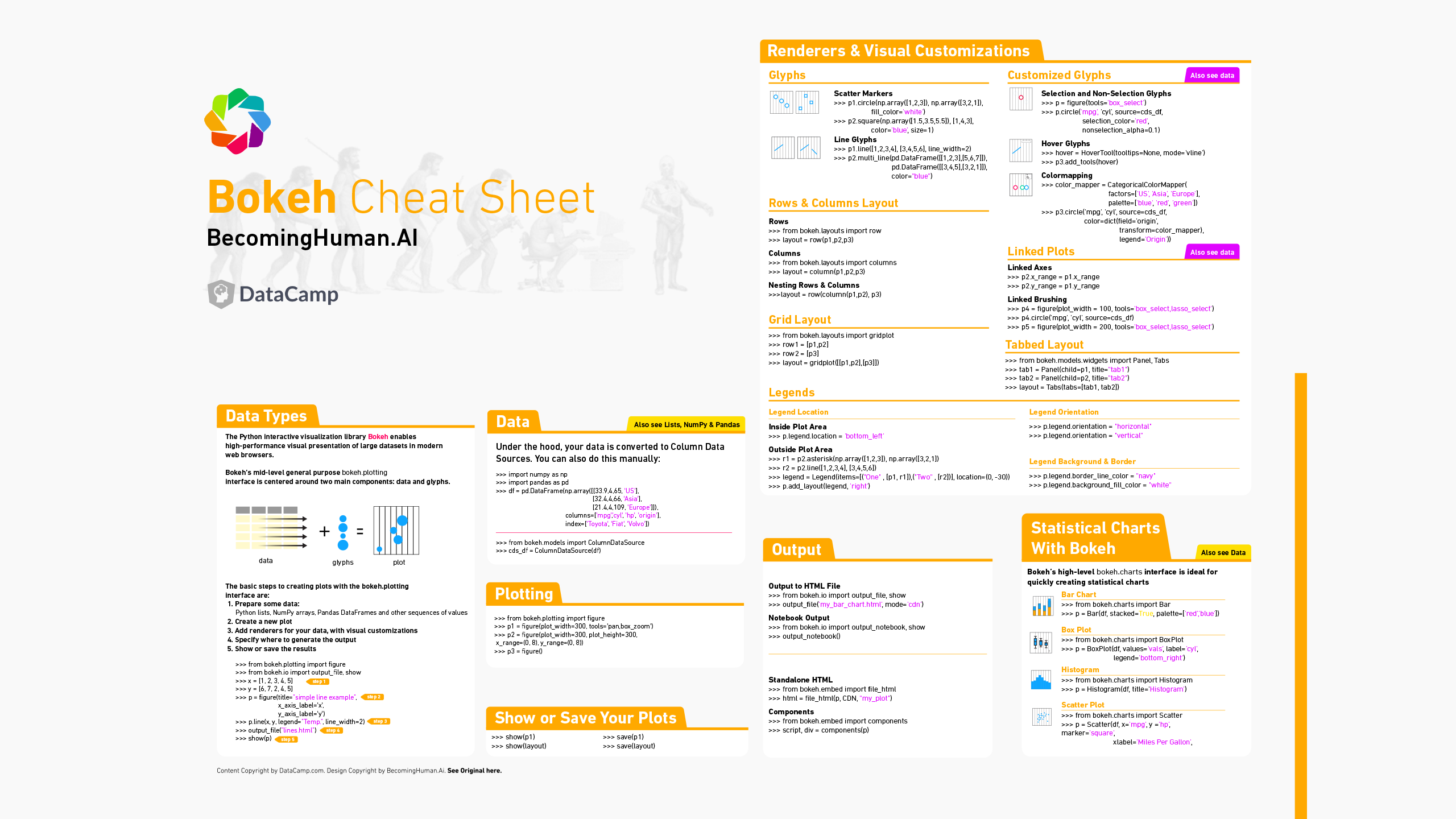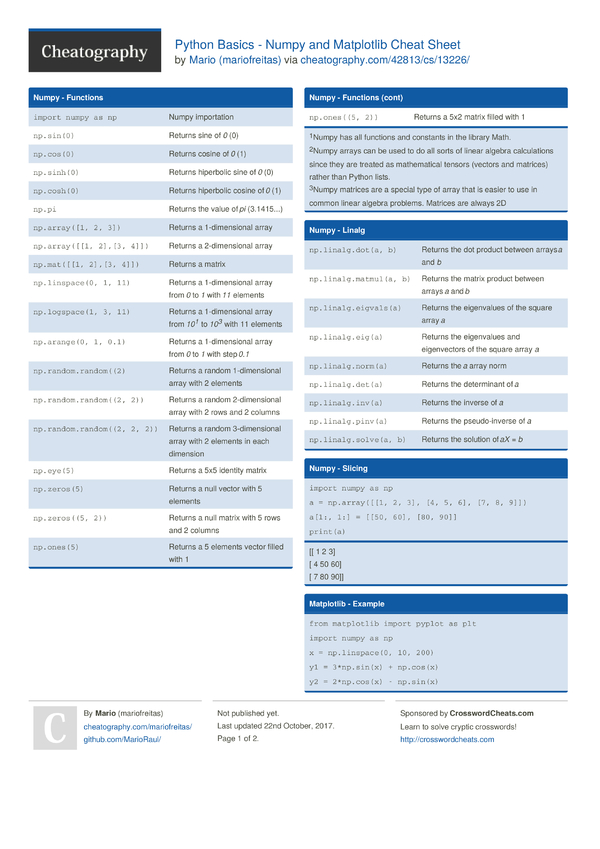The Pandas library is built on NumPy and provides easy-to-use data structures and data analysis tools for the Python programming language.The Pandas cheat sheet will guide you through the basics of the Pandas library, going from the data structures to I/O, selection, dropping indices or columns, sorting and ranking, retrieving basic information of the data structures you’re working with to. View Numpy Cheat Sheet from BMEN 207 at Texas A&M University. ' numpy cheat sheet Created on Wed May 27 11: @author: john.hanks version 1.0 ' import numpy as np a = 0,1,2.0,3,4,5,6,7,8 a. Summarize Data Make New Columns Combine Data Sets df'w'.valuecounts Count number of rows with each unique value of variable len(df) # of rows in DataFrame. MATLAB/Octave Python Description a(2:end) a1: miss the first element a(1:9) miss the tenth element a(end) a-1 last element a(end-1:end) a-2: last two elements Maximum and minimum MATLAB/Octave Python Description max(a,b) maximum(a,b) pairwise max max(a b) concatenate((a,b)).max max of all values in two vectors v,i = max(a) v,i = a.max(0),a.argmax(0).
Little time to learn NumPy? This article shows you the ten most amazing NumPy cheat sheets. Download them, print them, and pin them to your wall — and watch your data science skills grow! 🐱🏍
All NumPy cheat sheets in this article are 100% free. All links open in a new tab (so feel free to click all links without worrying about losing this page).
Here’s a quick summary if you don’t have time reading all cheat sheets:
Here’s a quick download for you: I created this cheating sheet to explain some important NumPy concepts to my coding students.
NumPy is a widely used Python scientific computing package. It simplifies linear algebra, matrix computations, and speeds up data analysis. Knowing NumPy is a prerequisite for other Python packages like pandas or Scikit-Learn.
This article should serve as the ultimate NumPy reference. The cheat sheets are diverse and range from one page to multiple pages. They also involve cross-language comparison cheat sheets. While some resources are great beginner’s references, others are involved and require high-level expertise.
Cheat Sheet 1: DataCamp NumPy
DataCamp is an online platform that offers data science training through videos and coding exercises. This cheat sheet is one of the most comprehensive one-page cheat sheets available. In a way, it adds to the previous cheat sheet with more examples and more functions. It is a good summary of creating arrays and basic array design. This cheat sheet provides functions for the specific datatypes. At the end of the sheet is more advanced stuff like slicing and indexing. There are also some introductory tools for data analysis and array manipulation. Though overall, this is a fantastic resource, the one drawback is the color palette. The bright orange is a distraction from the content. If you like the color palette, this could be your comprehensive go-to list of the NumPy basics.
- Pros: Comprehensive, graphics, very dense
- Cons: Overwhelming, color may distract
Cheat Sheet 2: Basic NumPy
This is a useful resource for the NumPy basics. It provides a summary of creating arrays and some basic operations. It is minimalistic, with a good overview of many basic functions. The sheet is divided into sections with headers for easier orientation. On the left-hand side of the sheet, the NumPy import convention is mentioned import numpy as np. A one-line explanation follows each function. The biggest advantage of this list is good readability. This enables a quick search for the right function.
- Pros: Lightweight, basics, minimalistic, readable
- Cons: Shallow, distracting background image, no visuals
Cheat Sheet 3: A Little Bit of Everything
The cheat sheet is divided into four parts. The first part goes into details about NumPy arrays, and some useful functions like or finding the number of dimensions. The 2nd part focuses on slicing and indexing, and it provides some delightful examples of Boolean indexing. The last two columns are a little bit disconnected. They provide a wide range of functions, ranging from matrix operations like transpose to sorting an array. However, the last two columns are not necessarily grouped conveniently. The advantage of this sheet is that it also includes Boolean and not only the numerical types.
- Pros: Focus on slicing and dimensionality
- Cons: Disconnected content, slightly confusing, no graphics
Cheat Sheet 4: Data Science
Dataquest is a similar online platform to DataCamp. It offers a variety of data science tracks and lessons, followed by coding exercises. This is another good resource of the most important NumPy functions and properties. The cheat sheet is readable with distinct sections, and each section has a clear title. Besides the sheet organization and excellent readability, it provides a range of functions and operations. Also, compared to the previous two cheat sheets, there is a math and statistics section. It divides the math sections into scalar and vector math, and there is a statistics section at the bottom.
- Pros: Statistics, HTML-based, well-structured, comprehensive, readable
- Cons: No graphics
Cheat Sheet 5: NumPy for Matlab Users

If you are a Matlab user and need a quick introduction to Python and NumPy, this could be your go-to. The sheet contains three columns – the first column is the Matlab/Octave, the second column are the Python and NumPy equivalents, and the third is a description column. The sheet’s focus is not solely on NumPy, but there are many Python basics listed. Since it is not a single sheet, the content is organized into separate sections. It provides math, logical and boolean operators, roots and round offs, complex numbers, extensive linear algebra, reshaping and indexing, some basic plots, calculus, and statistics.
- Pros: Matlab, Python background, a wide spectrum of related content
- Cons: Unfocused, not visually too appealing, font choice strange
Cheat Sheet 6: The Matrix
This cheat sheet provides the equivalents for four different languages – MATLAB/Octave, Python and NumPy, R, and Julia. The list is not a single PDF sheet, but it is a scrollable document. On each far left-hand and the right-hand side of the document, there are task descriptions. This is an extensive sheet, and it is extra useful because the output of each task is given. The sheet covers creating and designing of matrices, matrix shape manipulation, and some basic and more advanced matrix operations. The advanced section is particularly interesting because it lists many useful functions in data analysis, like finding a covariance and eigenvalues and creating random normally distributed variables.
- Pros: Wide spectrum of related topics (Matlab, Python, NumPy, R, Julia), advanced-level features
- Cons: Bad readability, no PDF download
Cheat Sheet 7: Numerical Analysis
This is the most comprehensive sheet on the list. Not only that includes side-to-side equivalents between MATLAB, R, NumPy, and Julia; and it also covers everything from functions and syntax, to loops and I/O. The most interesting and useful component is that certain lines like a function definition are given for MATLAB, R, and Julia, but not for NumPy because of the lack of that functionality. That makes it easy to compare and contrast and to find the best fit for a project.
- Pros: Extremely comprehensive
- Cons: Not well-structured, poor design, no PDF download

Cheat Sheet 8: NumPy for R (and S-plus) Users
Although there are other comparison cheat sheets in this collection, this one lists some advanced features. As the title says, it is a comparison between R(and S-plus) and NumPy. It is very detailed for each family of operations. For example, the sorting section provides eight ways to sort an array. Some operations are not possible in both languages, so it is easy to find the right function. This is the only cheat sheet in the collection that provides detailed plots and graphs. Moreover, some advanced math and statistics were given, like differential equations and Fourier analysis.
- Pros: Advanced-level, comparison-based (R vs. NumPy), detailed, plots and graphs
- Cons: Confusing, not focused
Cheat Sheet 9: Scientific Python
This is not a NumPy specific sheet. It covers many Python data science topics, but also some Python basics. It is easily navigated through because of the contents given in the beginning. The NumPy section is comprehensive. It covers NumPy basics like the array properties and operations. Also, it contains an extensive list of math functions and linear algebra functions. Some of the useful linear algebra functions are finding inner and outer products and eigenvalues. Others are functions for rounding off and generating random variables.
- Pros: NumPy + science, maths, linear algebra, beautiful design
- Cons: No PDF download, no visuals
Cheat Sheet 10: Finxter NumPy
The Finxter cheat sheet is different from all the previously mentioned sheets because it’s visually the clearest. It gives a detailed description of each function and lists the examples along with the outcome. The good thing about the visible outcome is that looking at it can help if you’re unsure about the name of the function. Along with the cheat sheet, there is an accompanying video with further detailed examples and explanations.
- Pros: Easy, simple, visually clean, and focused on the most important functions
- Cons: No graphics
Bonus Cheat Sheet: From NumPy to xtensor
xtensor is a C++ library, similar to NumPy, made for numerical analysis. The cheat sheet provides a two-column view, where the first column is NumPy, and the second column contains the xtensor equivalents. The sheet focuses on array initialization, reshaping, and slicing functions. Further, it continues with array manipulation like transpose or rotation functions. There are a lot of tensor operations, but the sheet is missing the descriptions. So, it’s not always easily deducible what a certain function does.
Numpy And Pandas Cheat Sheet
- Pros: Only xtensor sheet, simple, comparison-based
- Cons: Too specific for most coders
Attribution
Scipy Cheat Sheet Pdf
This article is contributed by Finxter user Milica Cvetkovic. Milica is also a writer on Medium — check out her profile.
Where to Go From Here?
Datacamp Numpy Cheat Sheet
A thorough understanding of the NumPy basics is an important part of any data scientist’s education. NumPy is at the heart of many advanced machine learning and data science libraries such as Pandas, TensorFlow, and Scikit-learn.
If you struggle with the NumPy library — fear not! Become a NumPy professional in no time with our new coding textbook “Coffee Break NumPy”. It’s not only a thorough introduction into the NumPy library that will increase your value to the marketplace. It’s also fun to go through the large collection of code puzzles in the book.
Related Articles:
Numpy Cheat Sheet
Related Posts
